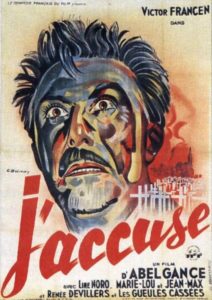 A French anti-war “classic” notable for its horrific climax. Bold, innovative and grotesque (for the time, anyway), the sequence in question, involving a procession of zombies that predated CARNIVAL OF SOULS and NIGHT OF THE LIVING DEAD by over twenty years, remains startling and audacious. The rest of the film not so much.
A French anti-war “classic” notable for its horrific climax. Bold, innovative and grotesque (for the time, anyway), the sequence in question, involving a procession of zombies that predated CARNIVAL OF SOULS and NIGHT OF THE LIVING DEAD by over twenty years, remains startling and audacious. The rest of the film not so much.
There have been great anti-war films, from Stanley Kubrick’s PATHS OF GLORY to Cornell Wilde’s BEACH RED to Elem Klimov’s COME AND SEE, but Abel Gance’s J’ACCUSE! (I ACCUSE; 1937), despite what some critics would have you believe, is not among them. Gance was one of the cinema’s great innovators, but dramatically his films—NAPOLEON, BEETHOVEN, END OF THE WORLD—tend to be uninspiring, to say the least. Heavy handed to the point of absurdity, J’ACCUSE! was a remake of Gance’s 1919 silent film of the same name, refurbished as an outcry against the onslaught of WWII. That the film failed to halt the war shouldn’t surprise anyone, as it neglects to address the underlying causes of the conflict and nor does it allow for contrary opinions. Still, the opening dedication does resonate, perhaps more so nowadays than it did back in 1937: “To the war dead of tomorrow, who will doubtless look at it skeptically, without recognizing themselves in its images.”
Jean Diaz is a research scientist fighting for France in the final battle of WWI. Diaz’s superiors make a questionable decision in sending him and his fellow soldiers into battle at all, and most are killed. Back home Diaz, one of the few survivors of the above battle, becomes determined to put a stop to all future wars. Unfortunately, Europe begins mobilizing for a new, even more cataclysmic conflict (as it was in real life), and Diaz’s fellow researchers devote their time to designing new instruments of destruction for use in the forthcoming conflagration.
Clearly, drastic action is required if Diaz is to accomplish his goal of ending war. Rapidly descending into madness, Diaz forsakes his family to live near the graveyard where his fellow soldiers are buried. He starts hearing their voices speaking to him, leading Diaz to his final, drastic act: he literally calls up the ghosts of those killed in the war, resulting in mass chaos as wave upon wave of the walking dead, many of them grotesquely deformed, roam through the streets and countryside of France. In the melee Diaz is captured and burned to death in the town square, thus adding another face to the procession of zombies.
As with most of Abel Gance’s films, J’ACCUSE is visually impressive but otherwise pretty inert. None of the characters resonate, including the protagonist, who never comes off as anything more than a mouthpiece for the director’s pacifist sentiments. The editing is obnoxiously choppy, although in Gance’s defense this may be due to the fact that the film was cut up by French censors and then pieced back together several years after the fact (this would explain the inconsistencies in the film stock). Again, however, the visuals are impressive, particularly in the increasingly shadowy and expressionistic final third, which reaches its apex with the walking dead finale. Gance is at his innovative best herein, with vertically tilted shots, distorted images and dozens of deformed bodies and faces superimposed over water, streets and country roads (a primitive effect by today’s standards but an unprecedented one in 1937). Lasting nearly a full ten minutes and bolstered by a powerful music score by Henri Verdun, it’s a majestic and overwhelming sequence, certainly one of the highlights of Gance’s career. If only the rest of the film lived up to it…
Vital Statistics
J’ACCUSE!
Forrester-Parant Productions
Director: Abel Gance
Producer: Abel Gance
Screenplay: Abel Gance, Steve Passeur
Cinematography: Roger Hubert
Cast: Victor Francen, Jean-Max, Renee Devillers, Marie Lou, Line Noro, Paul Amiot, Jean-Louis Barrault, Marcel Delaitre, Romuald Joube, Andre Nox, Georges Rollin, Georges Saillard
